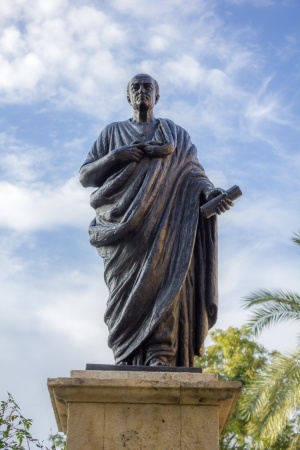Seneca Speaks!
A few hundred years ago, every advanced education was a ‘classical’ education where students would read the writings of ancient Greeks and Romans. Although these works were what Jefferson, Washington, Adams, and all the other founding fathers had studied as schoolboys, in modern America, these books are fairly obscure to most people, as they have been removed from the canon.
In college, I studied Latin for a few years. I cannot claim to be a scholar of this dead language, but I did learn one grand lesson: these ancient thinkers, from Catullus to Cicero, actually had extremely modern ideas (or, at least, a high percentage of the time). In 2005, Penguin Books published the Great Ideas series, which included a work by Lucius Annaeus Seneca (Seneca the Younger) entitled On the Shortness of Life. I recently purchased a copy and it was indeed worth the money. Seneca was a stoic philosopher from Spain who died in 65 A.D. and his ideas on Life Management still resonate today, as they are both useful and practical. I’ve decided to “interview” him in order to distill his thoughts on this topic. The below Seneca quotations are from a variety of his letters and works.
The Seneca Interview
Q: Seneca, do you feel like life is too short to get everything done?
S: “Life is long enough, and it has been given in sufficiently generous measure to allow the accomplishment of the very greatest things if the whole of it is well invested. But when it is squandered in luxury and carelessness, when it is devoted to no good end, forced at last by the ultimate necessity we perceive that it has passed away before we were aware that it was passing. So it is—the life we receive is not short, but we make it so, nor do we have any lack of it, but are wasteful of it.”
Q: Why should one have life goals?
S: “Our plans miscarry because they have no aim. When a man does not know what harbor he is making for, no wind is the right wind.”
Q: Good Point. So, if one has goals, what is the best way to make sure one is on-track?
S: “We should every night call ourselves to an account: what weaknesses have I mastered to-day? What passions opposed? What temptation resisted? What virtue acquired?”
Q: Many people have written about attitude. How does this impact one’s life?
S: “A man’s as miserable as he thinks he is.”
Q. When is the best time to complete one’s education? 18? 25?
S: “As long as you live, keep learning how to live.”
Q: What are your thoughts on persistence?
S: “Even after a bad harvest there must be sowing.”
Q: Why is that?
S: “It is a rough road that leads to the heights of greatness.”
Q: Ah, I see. So, I am guessing that you have strong thoughts about procrastination as well?
S: “While we are postponing, life speeds by.”
Q: So, does this mean you agree with the idea of “be here now” and to focus on the present moment?
S: “Expecting is the greatest impediment to living. In anticipation of tomorrow, it loses today.”
Q: Seneca, Thank you very much for your time. One Last Question: why should one read your works? Are you still relevant today?
S: “The only people really at leisure are those who take time for philosophy. They alone really live. It is not their lifetime alone of which they are careful stewards: they annex every age to their own and exploit all the years that have gone before.”
————-
If you would like to learn more, I suggest reading On the Shortness of Life as it is a slim volume and this version linked above is 100% free. Enjoy.
